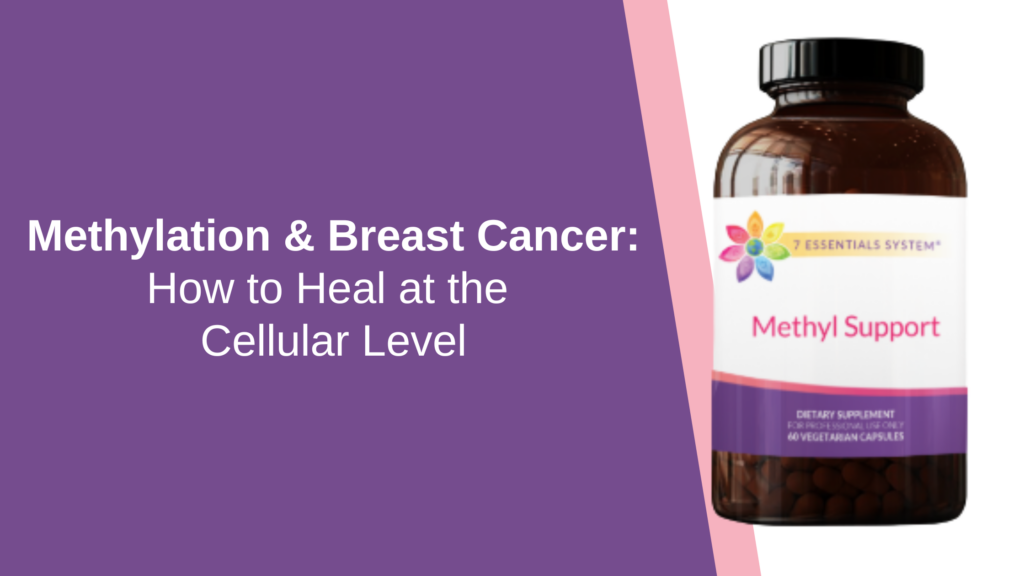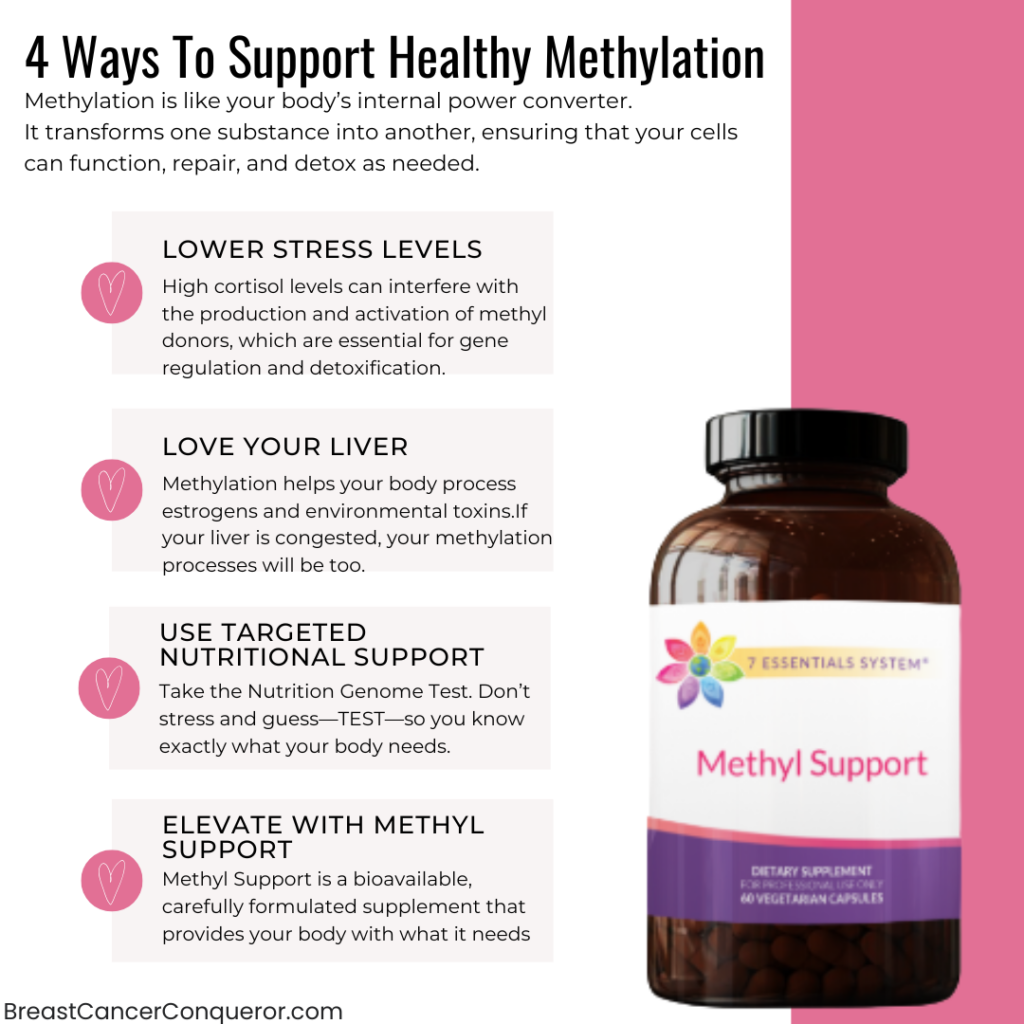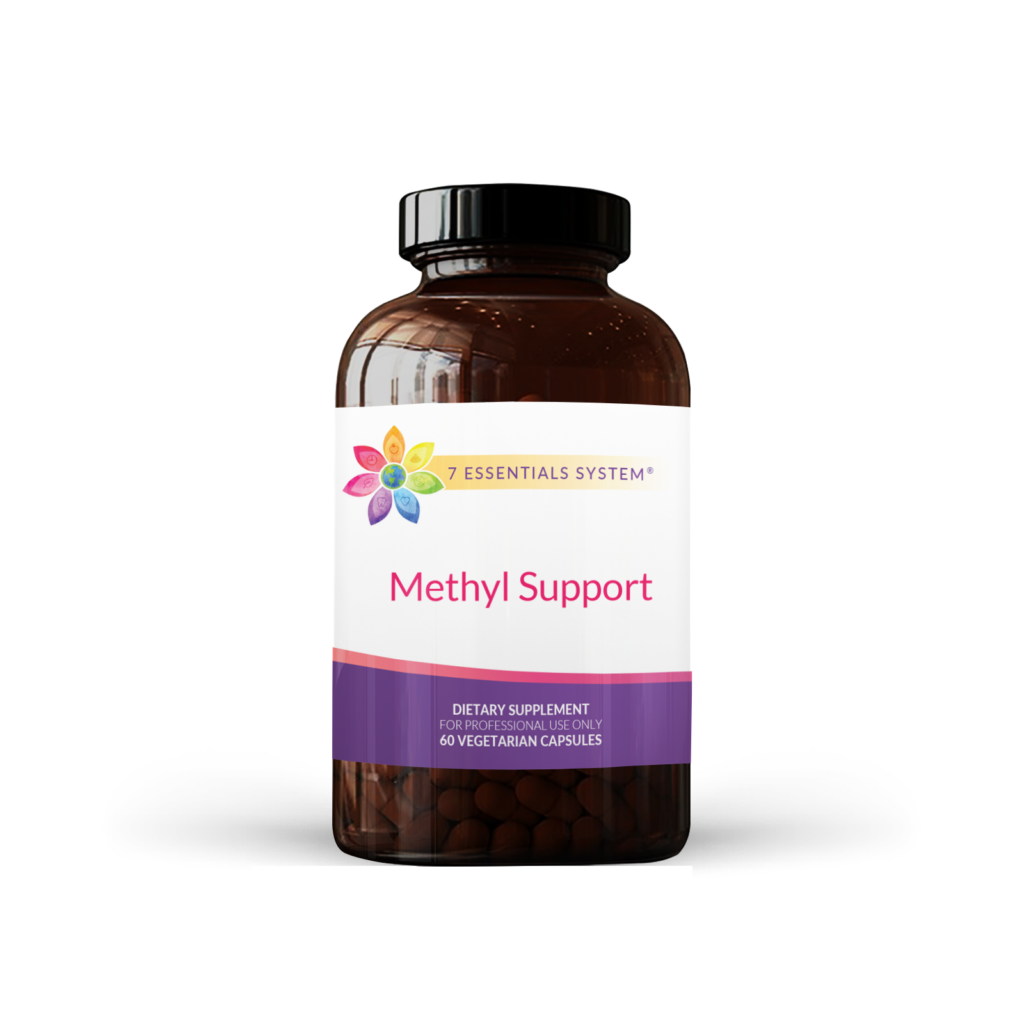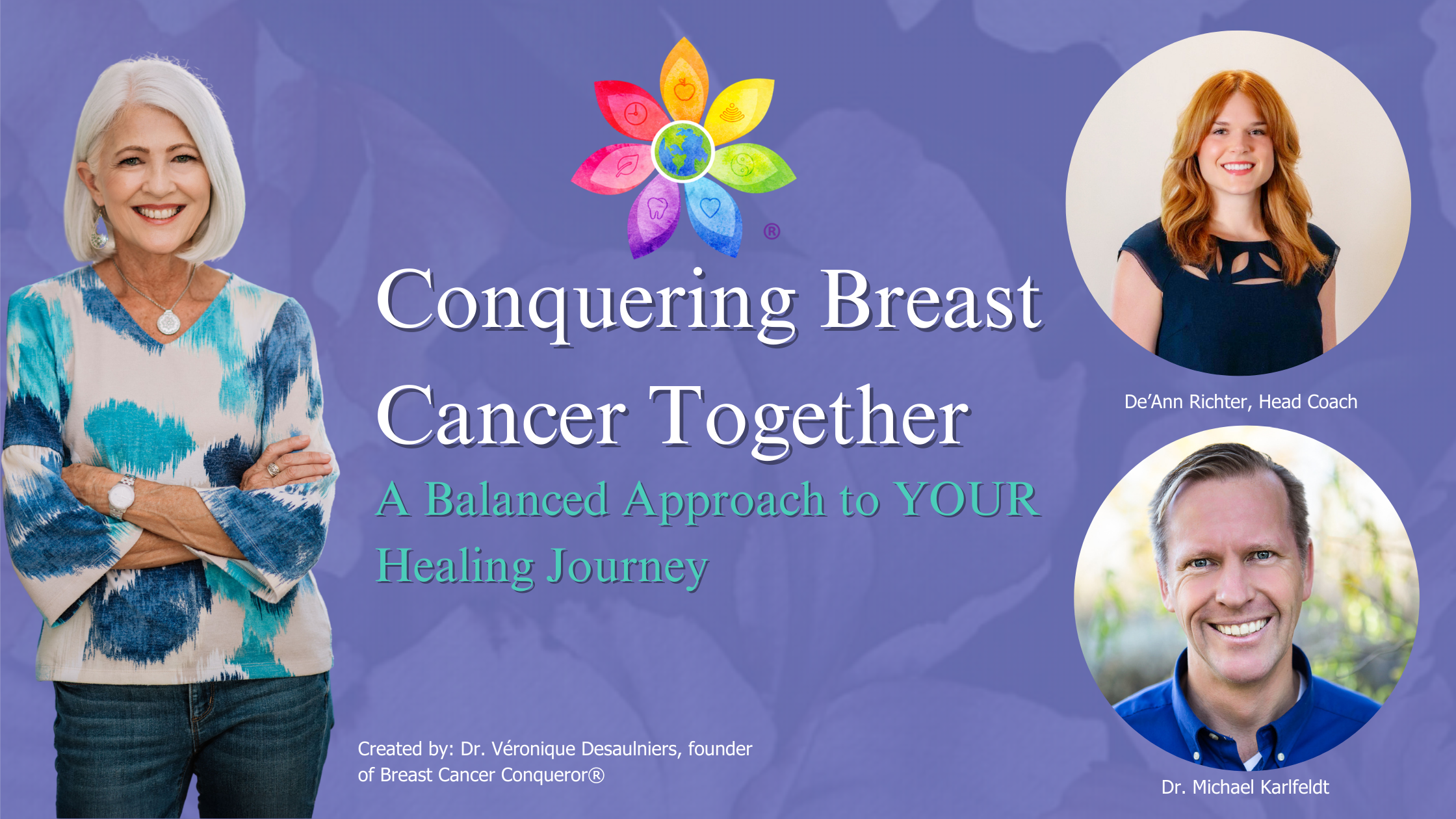
Quick Read:
- Methylation is a biochemical process that affects nearly every system in your body.
- Poor methylation is linked to elevated levels of homocysteine, a marker for inflammation and cardiovascular risk, as well as impaired P53 gene activity, your body’s frontline defender against cancer.
- Lowering stress levels, detoxing, and taking Methyl Support supplements are effective ways to support healthy methylation in your body.
Methylation. A confusing, complex, and often misunderstood topic that rarely gets the attention it needs. However, it’s an important thing to know for your healing journey, so read this blog and save it as your go-to cheat sheet.
Because trustworthy information = effective healing…and that is what we are all about!
Way back when Dr. V first started her healing journey, she stumbled on the term methylation because her homocysteine levels came back sky-high: 21 µmol/L (the healthy range is closer to 7 µmol/L) during a routine test. That wake-up call led her to uncover a crucial genetic detail: a mutation in her MTHFR gene. What Dr. V discovered changed the way she approached breast cancer healing—and it may just do the same for you—so you never have to fear breast cancer again!
What Is Methylation And Why Does It Matter?
First, let’s start with the basics. Methylation is a biochemical process that affects nearly every system in your body. It’s a crucial epigenetic change (we will discuss what this means in the next section) that involves the addition of a methyl group to DNA, primarily at cytosine bases that are followed by a guanine CpG dinucleotide.
In simple terms, methylation acts like a switch, turning genes on or off, regulating gene transcription, and contributing to genome stability. In super simple terms, think of methylation like your body’s internal power converter—it transforms one substance into another, ensuring that your cells can function, repair, and detox as needed. And like spark plugs in a car engine, when methylation is impaired, everything else (especially hormone balance and cellular integrity) can suffer.
Methylation is responsible for:
- DNA repair
- Detoxification
- Gene expression
- Estrogen metabolism
- Immune function
- Brain and cardiovascular health

What Is Epigenetics?
Epigenetics (epigenetic change) is the study of how the world you live in and how you interact with it can influence how your body reads a DNA sequence. In your life, this means: your genes aren’t the only thing that determines your health destiny. How you sleep, eat, breathe, detox, think, manage stress, exercise, enjoy life, and so forth, all play a massive role in preventing and healing from dis-eases, especially breast cancer.
For example, if you have a weakness with the MTHFR gene, your body may not methylate (methylation) or metabolize your estrogens properly. This can significantly affect mood, heart, and brain health…as well as lead to breast cancer.
However, you do have control over how you support that weakness with specific nutrients, therapies, and other health strategies that we will discuss below!
For a deeper dive into epigenetics, please review this blog post.
What Happens When Methylation Is Thrown Off?
Now, back to methylation and how it can impact your healing journey. Let’s get right to it: Poor methylation is linked to elevated levels of homocysteine, a marker for inflammation and cardiovascular risk, as well as impaired P53 gene activity, your body’s frontline defender against cancer. If methylation falters, your DNA repair systems, such as your P53 gene, do NOT work properly—letting cancer and other dis-eases sneak in.
THIS is why we think holistically—mind, body, soul—and home life, social life, work life…all of it! Your body is intrinsically connected; nothing happens in a silo. To learn more about your P53 gene, “Guardian of the Genome,” please read this blog post.
Methylation And Breast Cancer Risk: What The Research Says
Now that we have painted the bigger picture around epigenetics, the P53 gene, strong methylation pathways, and holistic breast cancer healing, let’s dive into the latest research.
- Dr. Steve Horvath’s research. One of the most striking discoveries in the field of epigenetics comes from Dr. Horvath, a biostatistician at UCLA known for developing the “epigenetic clock.” His research found that breast tissue surrounding cancerous tumors can appear up to 12 years “older” than healthy tissue based on its methylation profile. Meaning, abnormal methylation can be an early marker of cancer risk and biological aging.
- MTHFR and breast cancer risk are confirmed. Many studies, including this one, concluded: “There was a significant result for MTHFR 1298 and 677 polymorphism in relation to breast cancer risk.” This 2020 study also identified four breast cancer risk-related genes that are differentially methylated in both site-specific and DMR analyses (LHX2, TFAP2B, JAKMIP1, and SEPT9) in the main analysis of normal breast tissue, and three genes overlapping the main analysis and two independent datasets of normal breast tissue and blood (POM121L2, KCNQ1, and CLEC4C).
- More confirmation: This March 2025 report found, “Several Protein EpiScores, including many related to immune response, were associated with breast cancer risk, highlighting novel changes to the peripheral immune system that occur during breast cancer development.”
In short, recent studies confirm that methylation patterns in breast tissue can influence gene expression, hormone metabolism, and detoxification pathways. Women with methylation defects may be at greater risk for hormone-related cancers, including breast cancer. BUT this is not something you have to sit down and accept. Thankfully, you can take action right now to support and strengthen your methylation pathways.
4 Ways To Support Healthy Methylation
Supporting your methylation pathways can benefit your entire body, particularly in terms of detoxification, hormone balance, and DNA repair. Here are a few things you can do to get started:
-
Lower Your Stress Load
Chronic stress wreaks havoc on methylation. High cortisol levels can interfere with the production and activation of methyl donors, which are essential for gene regulation and detoxification.
This study in Epigenomics linked psychological stress to changes in DNA methylation patterns, especially in areas of the brain responsible for mood and memory. In other words, your mental and emotional state directly impacts your body’s biochemical balance.
Support your body by practicing stress management techniques such as:
- Deep breathing and meditation. Click here for tips and techniques.
- Exercise. Check out this blog on HIIT and exercise oncology.
- Emotional Freedom Technique (Tapping). Learn how to tap away stress right now.
- Laughing, connecting, and saying “no” to what drains you. A “No” can be the best “Yes” to your health and healing!
- Connect and have fun with friends. Discover the female friendship effect here.
-
Love Your Liver
Your liver is your main detoxification organ, and it plays a key role in methylation. Specifically, methylation helps your body process estrogens and environmental toxins through Phase II detox pathways. If your liver is congested, your methylation processes will be too. Detoxing and reducing toxic exposure is the focus of Essential #2, and here are several blogs on how to detox for breast cancer healing.
Here are a few practical things you can do today to reduce your toxic exposure and detox:
- Drink filtered water. Tap into why pure water is a must and good filtration options here.
- Do coffee enemas. Learn why and get our step-by-step guide via this blog post.
- Eat cruciferous veggies. They support methylation, estrogen metabolism, and you can learn all about how they control cancer’s “on and off” switches here.
- Take a Vitamin D supplement. It regulates inflammation in your liver, directly affects DNA methylation patterns, and does wonders for your body and body healing. Please take a moment to unearth why Vitamin D is critical to your healing journey.
-
Use Targeted Nutritional Support
To uncover more precisely what you should be eating, based on your DNA, take the Nutrition Genome Test. Don’t stress and guess—TEST.
-
Elevate Your Healing With Methyl Support
Give your body exactly what it needs to experience peak health and healing. Methyl Support is a bioavailable, carefully formulated supplement that provides your body with what it needs to optimize

methylation with these two proprietary blends:
- NatureFolate™: This bioavailable folate blend contains a mix of naturally occurring folates (not synthetic folic acid) along with supportive B vitamins like B12 and B6, which are essential for activating methylation.
- Homocysteine Supreme™: This blend supports the conversion of homocysteine into beneficial amino acids like taurine and cysteine, as well as neurotransmitters like dopamine and norepinephrine. These compounds are critical not only for methylation but also for brain health, immune function, joint health, and cardiovascular wellness.
Methyl Support goes far beyond your standard B-complex. It’s a next-level formulation tailored for those who want to actively support detoxification, hormone balance, and DNA repair, especially while healing from breast cancer.
Don’t Overlook Methylation
 Even though methylation isn’t “trendy,” it’s one of the most powerful processes your body depends on daily. But you are reading this because you want to know what really works for breast cancer healing and vibrant health, not the next hot thing. Therefore, read, review, and then act!
Even though methylation isn’t “trendy,” it’s one of the most powerful processes your body depends on daily. But you are reading this because you want to know what really works for breast cancer healing and vibrant health, not the next hot thing. Therefore, read, review, and then act!
If you are ready to dive deeper into your healing and truly follow the 7 Essentials System®, then step into our self-paced course now—Conquering Breast Cancer Together: A Balanced Approach to YOUR Healing Journey. It will guide you through harmoniously blending natural medicine with conventional care to curate your most effective plan.
